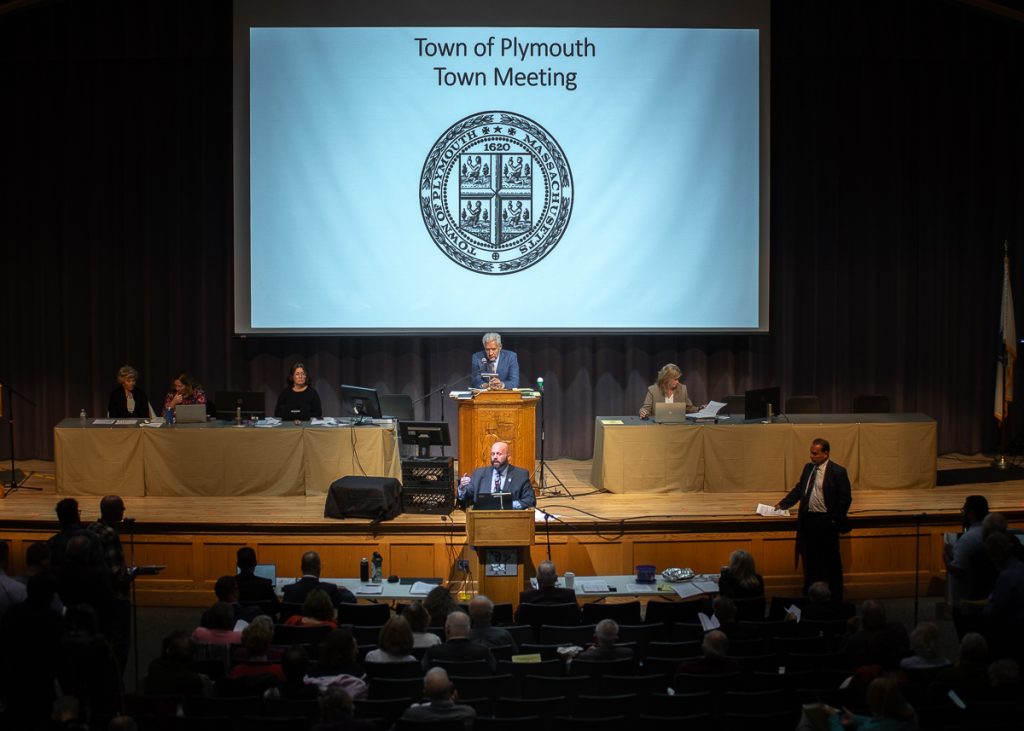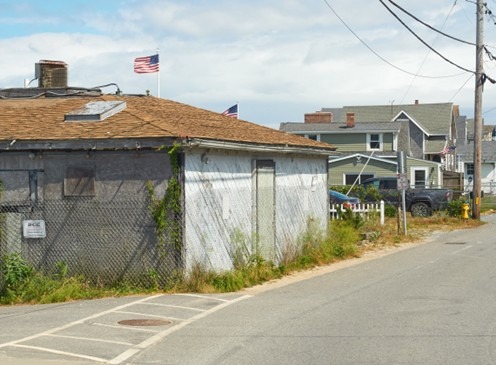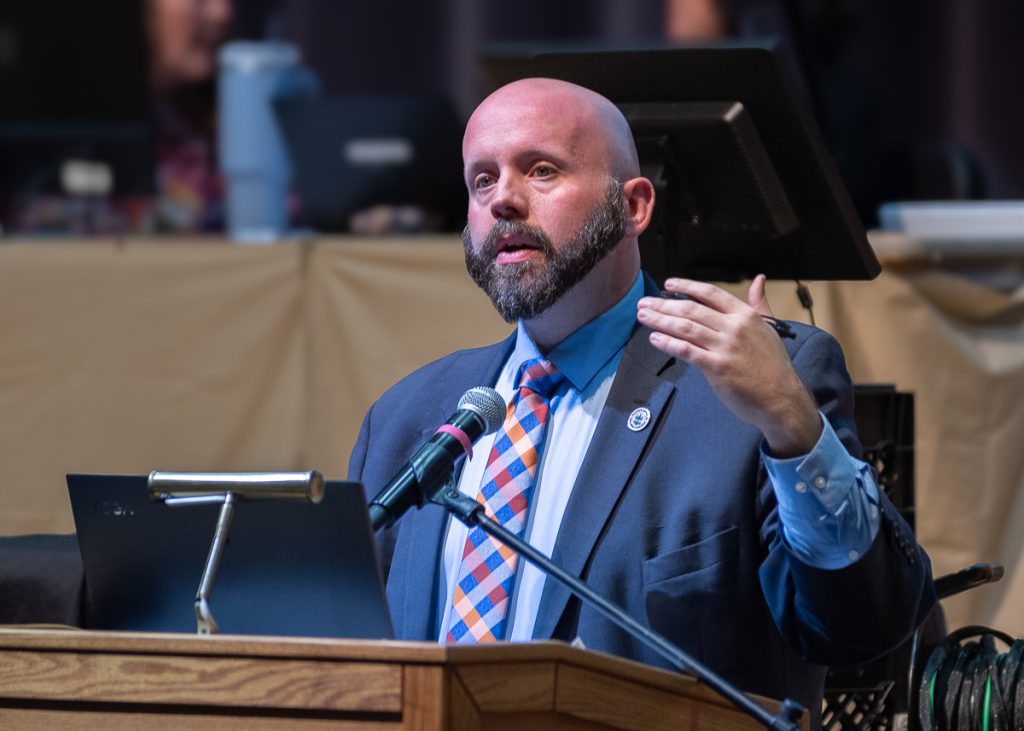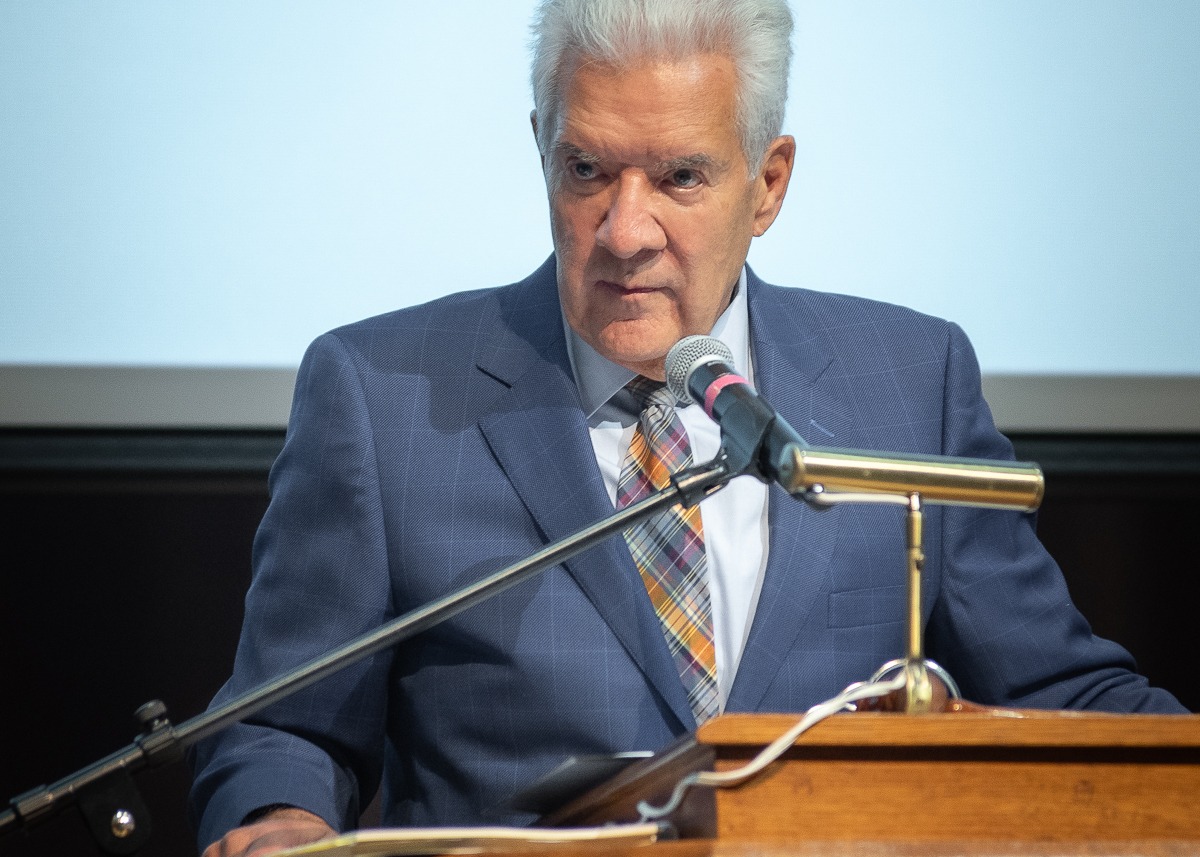Town Meeting members Saturday voted in favor of establishing a land bank, prevented a change in the charter that would have made it possible for the town to take over maintenance and management of school buildings, and left moderator Steven Triffletti with the sole power to appoint members of a key committee.
Representatives – who convened in the auditorium at Plymouth North High School – also approved the town’s purchase of former cranberry bogs for open space and recreation and properties at White Horse Beach to improve public access to the shore.
Along the way, they argued for hours over proposed minor changes in the town charter. But they still managed to work through the entire Town Meeting warrant in one day.
The land bank issues alone took two hours of deliberation, before culminating in a rare tie. Members voted 71-71. Triffletti, who has the power to vote in case of tie votes, the voted in favor of the proposal. He said it was only the fourth time in his 33 years as moderator that he had to settle a tie vote.
Of note, five of the 162 elected Town Meeting seats are empty because not enough people ran for a seat in some of 18 Plymouth’s precincts.

Here is a look at some of the key votes and moments from Saturday’s marathon.
Article 10: Black Cat Road
Town Meeting overwhelmingly approved a Community Preservation Committee proposal to spend $115,000 for the purchase of about 90 acres from A. D. Makepeace, owner of the Redbrook development in South Plymouth, for $115,000. The parcel is made up of former cranberry bogs at Black Cat Road, adjacent to the headwaters of Town Brook.
The vote was 134-1.
The property has been appraised at $1.15 million, but the town was awarded a state grant that covers 90 percent of the purchase price.
Some 70 acres will be restored to the kind of wetlands that once were on the land. The project is expected to improve the water quality of Billington Sea and Town Brook. The other 20 acres will be open space for walking and biking.
– Fred Thys
Article 11 White Horse Beach access

By a vote of 129-6, Town Meeting gave the green light to a Community Preservation Committee proposal to buy six small parcels at White Horse Beach, including the dilapidated building that once housed the Full Sail bar.
“This building has a been a blight for a number of years,” said Edward Bradley, chair of the Community Preservation Committee. “It’s a chance for the town to have some beachfront public access.”
The bar had been shuttered for years when it was ravaged by fire in 2016. The town earlier unsuccessfully tried to buy the property so it could raze the building.
The town will pay the appraised price of $655,000 for the six privately owned properties, and allocate another $220,000 to demolish the structure, build a wheelchair-accessible path to the beach, improve the 24-car parking lot with gravel, landscape the parking lot and the beachfront, and possibly provide benches and shade sails like the ones at Stephens Field.
– Fred Thys
Article 16: Rezoning the waterfront for ‘village open space development’
Town Meeting members voted 126-8, with two abstentions, to allow Village Open Space Development zoning in the waterfront district.
Village Open Space Development zoning requires developers to reserve 40 percent of a project’s land as open space.
When a developer comes before the Planning Board, the board has the power to negotiate whether the public can have access to that space. In exchange, the developer would be allowed greater housing density – meaning more housing units built on a smaller footprint.
The waterfront district issue came up in July, when developer Tom Drummond asked for the zoning change. Drummond wants to develop four acres just south of Hedge Road, on the shore in North Plymouth.
The Planning Board would have to waive requirements that the development have a minimum amount of street frontage and instead allow Drummond to create access through a right of way. The area is zoned for multifamily housing, but he wants to build up to five large single-family homes. To develop the property that way, he asked that the waterfront area be rezoned for village open space design, which would give him concessions such as the ability to build large single-family homes on a four-acre lot.
– Fred Thys
Article 17: Creation of a land bank
After lengthy debate, Town Meeting members found themselves deadlocked on the proposal, 71-71. Triffletti is not obligated to break a tie, but he opted to, explaining that ultimately, voters will have to ratify Town Meeting’s decision.
“I am satisfied that voters are going to have an opportunity,” he said.
The proposal to create a land bank now heads to the state Legislature for approval. If Beacon Hill signs off – which is not a sure thing – Plymouth voters would then decide in a town election whether they want a land bank.
The land bank would be established for the purpose of acquiring property for open space and recreation, affordable housing, and municipal facilities such as schools, fire and police stations, and Department of Public Works facilities.

“If we own the land, we can control the land,” said Select Board member Kevin Canty, who led the presentation of the project. Significantly, it’s a way to minimize the number of 40b projects in town.
But many representatives opposed taking control of land purchases out of the power of the town’s legislature (Town Meeting), since those decisions would be made by an independent appointed committee.
“We have no decision over the purchasing of this land,” said Virginia Davis, a Town Meeting member.
“You can appoint your friends and developers,” objected Town Meeting member Nancy Davis, referring to town officials. “We are here to decide how this town chooses to spend its money.”
The land bank would be funded by a land transfer fee of one-to-two percent on real estate transactions of $350,000 and higher. First-time homebuyers would be exempt, as would Plymouth residents, unless they are buying commercial property or an investment property. That means if you sold your home in Plymouth and bought another one in town, there would not be a transfer assessment.
Canty estimated that based on 2023 sales, the land bank could take in $7 million a year, prior to deducting exempted sales.
Some Town Meeting members objected, saying that there is no exception for older residents wanting to return to Plymouth to be closer to their family. Others said a two percent tax would make it even harder for young people to buy homes and for sellers to attract buyers.
The Community Preservation Committee already has the authority to propose the purchase of land for open space and to fund affordable housing. (That money comes from a fee added to quarterly property taxes.) But the state’s Community Preservation Act does not allow money to go toward purchasing land for municipal use, like a DPW building.
Another difference: the Community Preservation Committee can only pay up to the appraised value of a property. The land bank would be able to pay market price, which would make it easier to close some deals.
Although the land bank would be able to buy property without Town Meeting approval, Town Meeting would have to agree to spending money for any building on the land.
A Land Bank Commission, empowered to run the land bank, would be appointed by several town bodies. The Select Board, the Committee of Precinct Chairs, and the Planning Board would appoint two members each. The Open Space Committee, the Land Use and Acquisition Committee, and the Affordable Housing Trust would appoint one member each.
Much of the opposition to the land bank was rooted in this arrangement.
Opponents argued that it would give too much power to the Select Board and the Planning Board.
Town Meeting member Ed Russell said that because the Select Board and Planning Board also appoint members of the other committees that would appoint members to the Lank Bank Commission, the two boards would exercise undue power, a lesson he said the town learned with the Select Board’s removal of members of the Community Preservation Committee.
He argued they already have too much control over the Community Preservation Committee, demonstrated by the removal of members who, Russell said, stood up for that committee’s independence from town officials.
Canty pushed back, saying the Select Board and Planning Board are made up of elected officials generally entrusted with the power to appoint committee members, except in the case of unelected committees that empowered to make their own appointments. He said since the land bank would buy property for open space and affordable housing, it is appropriate for the Open Space Committee, the Land Use and Acquisition Committee, and the Affordable Housing Trust to have appointment powers. Canty also addressed concerns that the land bank might engage in real estate speculation.
“They can’t just buy land just to buy land and see what they want to do with it later,” he said.
“This is not just a land grab,” Town Meeting Don Williams shot back. “I believe that this is a power grab.”
Williams asked whether the Land Bank Commission would become another Plymouth Foundation, a private nonprofit corporation now involved in the development of a business park opposed by some Cedarville residents.
Plymouth’s land bank would not set a Massachusetts precedent – Nantucket and Martha’s Vineyard have them, and Cape Cod used to have one. (The legislation that created the Cape Cod land bank expired in 2020.)
– Fred Thys
Controversy over a pro-Palestine group

Prior to Saturday’ session, Triffletti had ruled three articles out of order, including a citizens petition calling for a moratorium on extending a runway at the airport and another supporting a ceasefire in Gaza. But he allowed airport opponents and members of a group called Plymouth for Palestine to set up information tables inside Plymouth North High School but outside the auditorium where Town Meeting was being held.
Upon returning from the lunch break, Town Meeting member Ethan Kusman, who said he is Jewish, objected to the Plymouth for Palestine table, accusing Triffletti of permitting political statements at Town Meeting.
“Allowing people to give us their propaganda during lunch?” Kusman said, announcing that he was leaving Town Meeting in protest. “We’re allowing them inside our building. I think it’s disgusting.”
Triffletti said Town Meeting has in the past allowed people to set up tables inside the building.
“I’m not about trying to regulate freedom of speech,” he said. “I tried to give them alternative ways to express themselves. As a moderator I don’t want to be in a position of deciding what materials are appropriate.”
“It was a poor decision,” Kusman said.
– Fred Thys
Article 21: Control of school buildings
By a vote of 84-47, with two abstentions, Town Meeting came up short of the two-thirds vote needed to amend the Town Charter language that makes the School Committee responsible for maintenance and management of school buildings.
The Charter Review Committee and the Select Board proposed the change to make it possible for the municipal side of government to assume control of school buildings.
The School Committee initially opposed the change.
As part of a compromise to get the School Committee to support Article 21, the Select Board proposed a bylaw for the spring Town Meeting in April that would keep school buildings and maintenance under the School Committee.
So, while a vote for Article 21 would have made it possible for the town to take over responsibility for school buildings, the bylaw, if passed next spring, would have kept that responsibility with the School Committee, for now.
Town Meeting members were not persuaded.
“What is the benefit of having the town have power over the superintendent?” asked Town Meeting member Tammy Johnson.
– Fred Thys
Article 25: Advisory and Finance Committee appointments
Town Meeting approved Article 25, a measure that would allow the moderator to retain sole authority to appoint members of the Advisory and Finance Committee, probably the most important unelected committee in town because it makes recommendations on warrant items to Town Meeting.
The Charter Review Committee had pushed for a broader committee made up of elected officials – and chaired by the town moderator – that would choose FinCom members. The Select Board, the Planning Board, the Committee of Precinct Chairs, and the School Committee would each appoint one member.
But the Advisory and Finance Committee opposed Article 25, saying elected officials, who have a “definite conflict of interest” should not be given authority to make such key appointments.
Instead, they recommended the moderator continue to make the appointments, but at open meetings where applicants can be heard and questioned.
The moderator will retain the authority to fill vacancies on the committee, whose members serve three-year terms.
– Andrea Estes
Fred Thys can be reached at fred@plymouthindependent.org. Andrea Estes can be reached at andrea@plymouthindepenent.org.

